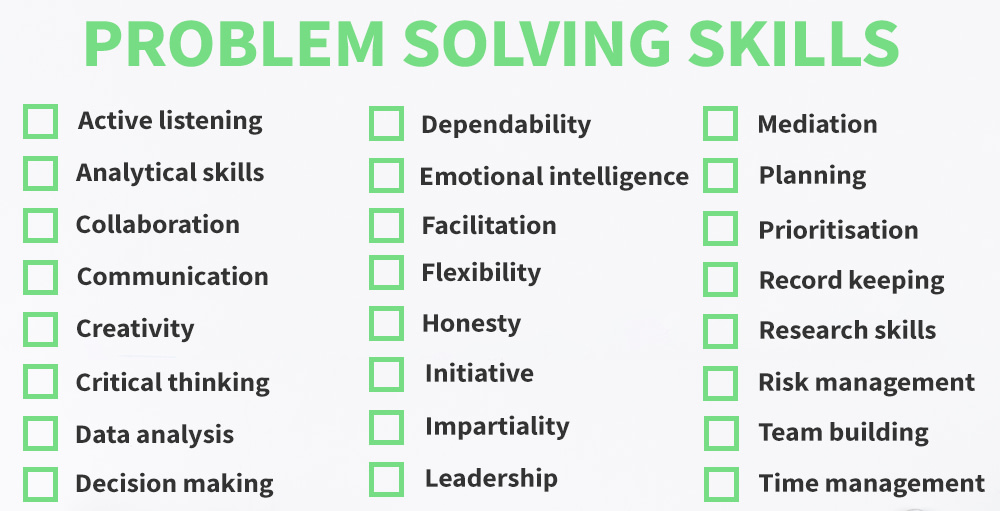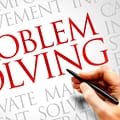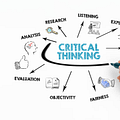”Anyone who cannot solve problems in this world is not worth living ”
Olawale Daniel
Problem-solving is an essential skill to survive, thrive and progress.
Because problem-solving is a complex process, it requires different abilities at every different level of problem-solving like researching and brainstorming to identify and define the problem, analytical thinking to analyze the situation, critical thinking to find the root cause and creative thinking to find new solutions for the problem.
It also requires to be Confident in uncertain situations and make the right decisions.
Apart from this, communicating the problem and solution to others and reliability are some other skills needed in problem-solving.
Therefore Problem-solving is an Umbrella Term for a variety of skills that help in effective problem-solving.
In this post, I am sharing the 13 competencies which are critical to problem-solving so that you can become aware of all these competencies and sharpen your problem-solving skills.
So here are the 13 competencies Problem Solving requires.
Do You Want To Solve Problems Like a PRO ?
Get the FREE Problem Solving Work Book HERE

13 DIFFERENT COMPETENCIES OF PROBLEM-SOLVING
1 INTUITION
Problem-solving requires the ability to trust your gut instinct and use your intuition to look for any clues around.
Having a high intuition will helps to sense a problem when it arises or in some cases, it helps in sensing a problem even before it arises.
2 OPENMINDEDNESS
Having an open mind is important for solving problems because sometimes the main cause of the problem you are facing is something else.
Open-mindedness makes it easier to devise more options for solutions.
It helps you to see the real reason, which is different from the one you thought.
This makes it easier to understand the wider range of problems and their implications on the organisation in the long run.
“Be open about your thoughts, ideas, and desires and you will be right with your decisions.”
Auliq Iceone
Open-mindedness is important to solving any problem.
3 ANALYTICAL THINKING
While Analysing the situation, thinking logically helps you to assess all the solutions and select the best ones.
Analytical thinking involves logical reasoning around why a problem happened, what impact it can have in the long term, analysis of the data, forecasting, generating options and solutions and picking the right ones which are practical to implement.
4.CREATIVE THINKING SKILLS
“Every problem has a solution; it may sometimes just need another perspective.” ― Katherine Russell
Sometimes creative solutions are one of the best solutions to some problems.
Creative thinking skills help you to think out of the box and think of new perspectives, providing innovative and customised solutions suited to a specific situation.
It makes problem-solving much easier and progresses faster.
.
5.ACTIVE LISTENING
Listening to those around you helps you to gather al the information needed to solve the problem and find the best solutions to the problem.
Active listening helps to give value to others opinions and experiences so that you can understand why the problem occurred in the first place .
6 POSITIVE ATTITUDE :
“If you saturate your mind with positive thoughts, it will sustain you in any situation.”
― Lailah Gifty Akita
It is important to keep calm and be clear-headed to arrive at solutions. Giving in to stress will only make matters worse.
Stress makes the brain cloudy and leads to making ill-informed and erratic decisions.
So remaining calm under pressure is important for problem solving .
Another important skill is to be courageous and confident that you will be able to arrive at great solutions, implement and carry them out.
If you exhibit in confidence, then the team members may distrust your problem-solving ability. This will make you an ineffective manager.
And if you are confident, you will be able to uplift the morale of the team and come up with the right solutions.
7 QUESTIONING
Questions are great tools for solving problems.
Pinpointing the root cause of problems, and asking the right questions expedites problem-solving process.
Asking direct and open-ended questions towards generating solutions will make problem-solving manageable and boost the morale of team members and increase productivity.
It will require some practice to pinpoint the cause of the problem and ask the right questions to solve them.
8 DECISION MAKING
While there are myriads of solutions before you, it becomes difficult to choose the right one.
Sound decision-making skills help you to consider the nature of the problem, see the possible setbacks, weigh the costs and resources, and how to implement the solution.
Good decision-making ability helps in comparing and selecting the right solution for every unique situation and being confident about it.
9 COMMUNICATION SKILLS
If you can find a great solution to a problem but are unable to relay the ideas succinctly and quickly through various levels, then all the good ideas will get lost and the whole purpose of solving the problem will be defeated.
To be a good problem solver, you also need to be an effective communicator.
Good communication aligned with transparency is critical to problem-solving because it builds trust with employees.
Employees feel valued and share their problems more openly.
Communication also helps to talk to team members easily and find the root cause of workplace issues from the employees.
Some skills like active listening, Persuasion, Negotiation, Mediation, Clarity of expression, Verbal and Written Communication, and Non-Verbal Communication like reading Body Language are essential to good communication.
10 PLANNING AND ORGANIZING
Once you choose a solution to a problem and communicate it to your team, you now need to carry out your plan.
You need to organize all the steps and resources strategically so that it creates alignment and efficiency in implementing the steps.
Setting up a strategy for your solution uses some problem-solving skills including:
To organize, you need to prioritize, take initiative, plan projects, manage time, hold meetings and create strategic schedules.
11 TEAM WORK
To solve problems you cannot work in silos.
Though the final decision has to be made by you, it is important to work cohesively with the team to arrive at the best solutions.
Effective problem solving requires collaboration with team members, delegating responsibilities to them, setting goals for them, depending on them, having faith in them, motivating them to come up with the best solutions, and working with them to help in creating and implementing those solutions.
So skills required for this are -Collaboration, Prioritising, Assessing employee strengths and weaknesses, Delegation of tasks, Goal setting Setting expectations, Resource allocation, Dependability, Trust and Respect Giving and receiving feedback, Performance evaluation, and Identifying outcomes.
12 EVALUATION OF SOLUTION .
While solving a problem it is important to evaluate if a solution is working or not and make necessary adjustments where required.
It is important to know whether your plan is working or not as quickly as possible so that you can pivot and try another solution. You need to be patient and flexible.
Activities in this stage involve -analyzing data, adapting, creating surveys and evaluating them, taking feedback from customers, following through, troubleshooting, keeping an open mind and identifying patterns, and being resilient.
13 DEPENDABILITY
Problems will never cease. They are an ongoing part of work.
Dependability is important to problem-solving.
You need to be a dependable person who shows up with integrity in every crisis.
A dependable person seeks long-term solutions and is willing to show up and deliver the solution through to the end.
He can be counted on at all times.
Read the Post –How to Solve Any Problem In 8 Simple Steps .
CONCLUSION
As I said at the beginning of the post Problem Solving is an Umbrella term that requires a broad set of skills to be effective at problem-solving.
Problem-solving skills require high cognitive abilities like observing, analyzing, brainstorming, decision making, and taking quick action when difficulties arise and they always do.
All the competencies listed above help you to prepare for problems before they happen, act quickly in any situation and mitigate the harmful effects in the future.
I hope you have got a wide knowledge of all the competencies of problem-solving.
You can also develop your competencies by reading books from renowned authors which contain helpful tools and techniques .
I would therefore like to ask you, what competencies are you missing out on? What do you need help with?
Please share your thoughts in the comments box below.
Babita Sharma
Leadership Coach
www.leadwithpassion.co.in







